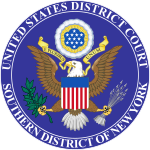This article needs to be updated. (August 2013) |
| United States v. Scheinberg | |
|---|---|
 | |
| Court | United States District Court for the Southern District of New York |
| Full case name | United States v. Isai Scheinberg, et al. |
| Decided | April 15, 2011 (indictment unsealed) |
| Docket nos. | 1:10-cr-00336 |
| Case history | |
| Subsequent action(s) | see below |
| Related action(s) | United States v. PokerStars, et al., 11 Civ. 2564 (2011) |
United States v. Scheinberg, No. 1:10-cr-00336 (2011), is a United States federal criminal case against the founders of the three largest online poker companies, PokerStars, Full Tilt Poker and Cereus (Absolute Poker/Ultimatebet), and a handful of their associates,[1] which alleges that the defendants violated the Unlawful Internet Gambling Enforcement Act (UIGEA) and engaged in bank fraud and money laundering to process transfers to and from their customers.[1] A companion civil case, United States v. Pokerstars, et al., 11 Civ. 2564 (2011),[2] included Full Tilt and Cereus (Absolute Poker), Ultimate Bet, Oldford Group, Rational Entertainment Enterprises, and many others as defendants and sought the recovery of forfeiture equalling approximately $3 billion in assets belonging to the companies.[3] After the indictment was unsealed on April 15, 2011, a date quickly dubbed Black Friday by the online poker community,[4][5] PokerStars and Full Tilt stopped offering real money play to their United States customers.[6] Three years after the start of the poker boom in 2003, the U.S. Congress passed UIGEA to extend existing gambling laws into cyberspace. The law made processing payments for illegal online gambling a crime; however, the defendant companies remained in the U.S. market in the belief that the law did not cover poker. A former payment processor for the companies turned state's evidence after initially being charged with violating UIGEA himself. On September 20, the civil suit was amended claiming individual fraud by Howard Lederer, Chris Ferguson, and Rafael Furst.[7][8]
On April 15, 2011, the U.S. Department of Justice seized the .com internet addresses of the three online gambling sites, replacing them with a takedown notice. On April 20, 2011, the U.S. Attorney's office returned the Pokerstars.com domain to the company, facilitating the withdrawal of U.S. players' funds. About 76 bank accounts in 14 countries were frozen, including an unknown amount of player funds.[9] Prosecutors demanded prison for 11 defendants, including website founders, U.S. payment processors, and a Utah bank executive, for a complex fraud scheme circumventing UIGEA banking laws. In response, Antigua and Barbuda weighed WTO action. The implicated firms stopped U.S. ads, leading to the cancellation of poker TV shows. Full Tilt's eGambling license was suspended in June, stopping all online activities, and permanently revoked by the Alderney Gambling Control Commission on September 29.
On July 31, 2012, the US government dismissed "with prejudice" all civil complaints against all PokerStars and Full Tilt Poker companies after coming to a settlement with PokerStars which includes PokerStars purchasing Full Tilt.[10] PokerStars and Full Tilt admitted no wrongdoing as part of the settlement, which ends all litigation between the government and the poker companies.[11] The U.S. Government recognized that both companies are eligible to apply for licenses to conduct online gaming in the U.S., contingent upon the provision of a legal structure for such licensing. The criminal indictments resulted in prison time for all three defendants.
This case had significant implications for the online poker industry and prompted discussions about the regulation of online gambling in the United States.
- ^ a b McLaughlin, David; Jinks, Beth (April 20, 2011). "Online Poker Companies Reach Accord With U.S. on Players' Access to Money". Bloomberg News. Retrieved April 21, 2011.
- ^ "Civil complaint". Scribd.com. June 1, 2011. Retrieved January 19, 2014.
- ^ Cite error: The named reference
SDNYwas invoked but never defined (see the help page). - ^ Silver, Nate (April 20, 2011). "After 'Black Friday,' American Poker Faces Cloudy Future". The New York Times (blog). Retrieved April 21, 2011.
- ^ Cite error: The named reference
UCDoOGwas invoked but never defined (see the help page). - ^ Cite error: The named reference
Aipilfwas invoked but never defined (see the help page). - ^ Berzon, Alexandra (September 21, 2011). "U.S. Alleges Poker Site Stacked Deck". The Wall Street Journal. Retrieved September 22, 2011.
- ^ Richtel, Matt (September 21, 2011). "Poker Web Site Cheated Users, U.S. Suit Says". The New York Times. Retrieved September 22, 2011.
- ^ Richtel, Matt (April 15, 2011). "U.S. Cracks Down on Online Gambling". The New York Times. Retrieved April 28, 2014.
- ^ "ESPN: PokerStars settles, acquires FTP". Espn.go.com. July 31, 2012. Retrieved January 19, 2014.
- ^ Vaughn, Jake. "Legal Status of Online Poker in the United States". OCBB. Retrieved April 28, 2014.
© MMXXIII Rich X Search. We shall prevail. All rights reserved. Rich X Search
